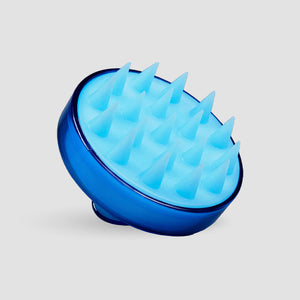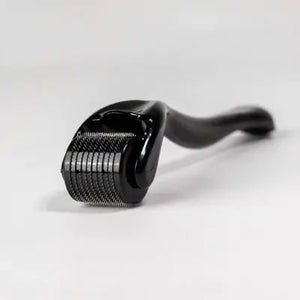Hair loss during pregnancy – the reasons
Increased hair loss during pregnancy occurs in some women. One possible cause is the corpus luteum hormone, which works together with estrogen to regulate pregnancy. This interaction can, however, also have a positive or negative impact on hair quality. For example, dry hair becomes even drier and is therefore more prone to breakage. Furthermore, the influence of hormones can synchronize hair growth phases, causing them to fall out together at the end of the resting phase.
The contraceptive pill

Women who have recently stopped taking the pill and then become pregnant very quickly are particularly likely to experience increased hair loss during pregnancy. This is due, among other things, to the fact that the pill artificially keeps estrogen levels high. Despite pregnancy, these women usually don't have as much of this hormone in their blood as they did while taking the pill. Consequently, their hair falls out because estrogen—as mentioned above—has a positive effect on the hair growth cycle.
Iron deficiency

For many women, hair loss during pregnancy is caused by
iron deficiency . The body needs up to 60 percent more iron during pregnancy for the child to grow properly. If the body doesn't get enough of this mineral, the first thing it does is discard additional "iron-eaters" that it believes it doesn't need. These are, in fact, the hair.
Other symptoms at a glance
Other symptoms, in addition to hair loss, include fatigue, pale skin, and possibly increased nervousness. If a pregnant woman notices these symptoms, a visit to the doctor is essential. The doctor will first take a blood sample to determine the hemoglobin level. If it is too low, appropriate treatment will be initiated. The nutrient deficiency usually occurs in the second trimester of pregnancy, but can also become noticeable earlier or later. Another factor that should not be underestimated in causing hair loss during pregnancy is, of course, stress. Many pregnant women experience stress during their pregnancy, especially if it is their first child. Stress has been proven to have a negative impact on hair growth.
What helps with hair loss during pregnancy?

If stress is the trigger for hair loss, the only thing that helps is to actively counteract it. For example, through certain relaxation techniques or yoga. Exercise can also help. A walk often clears the mind and puts many things back in perspective. A healthy and balanced diet naturally counteracts hair loss during pregnancy. Green vegetables increase your iron intake, which is essential during pregnancy. The body also draws important nutrients from nuts, oatmeal, and tofu, among other foods. It's important that you consume these foods unprocessed, perhaps even raw. Make sure you eat a variety of foods. A one-sided diet, no matter how healthy, can also lead to hair loss.
Hair loss after birth
However, it is much more common for women to suffer from hair loss after pregnancy. Estrogen production returns to normal, as does hair growth and hair lifespan. Medically, this type of hair loss is referred to as
postpartum effluvium . So, don't panic if you find a few extra hairs in your hairbrush after pregnancy or after giving birth. This is because the hair life cycle is shortening. However, hair loss during pregnancy should return to normal within eight weeks. However, some women whose hormones take a little longer. It becomes a concern when the lost hair doesn't grow back, meaning hair growth doesn't return to normal. Another warning sign is if an unusually large amount of hair suddenly falls out a few weeks after birth. In this case, it would be beneficial to consult a specialist to determine the cause.
Hair care during pregnancy

Generally, a woman doesn't need to change her hair care routine much during pregnancy. However, if her hair tends to be dry, it may be beneficial to use
special shampoos —also to prevent hair loss during pregnancy. Those with extremely sensitive hair should use large brushes with natural bristles. These generally don't damage the hair structure as much. Round brushes, flat irons, or curling irons are also taboo, so as not to put additional strain on your already damaged hair.
Conclusion: Hair loss during pregnancy can occur
Hair loss during pregnancy can be triggered by many factors. Stress can play a key role, as can the increased hormonal release during this exciting phase of life. Nevertheless, as a woman, you want to actively combat the problem without taking any risks. It's advisable to first consider special care products to curb hair loss for the time being. If shampoos or supplements don't really provide long-term relief, you should consider professional hair treatment for your hair loss after pregnancy. Do you have any questions about this topic or would you like more information about our treatments? Then contact our team of experts, who are always available to advise you. You can also request a free, no-obligation hair analysis. You, too, can benefit from the expertise of Dr. Balwi and his experienced team. Elithair stands for successful hair transplantation in Turkey.

 Women who have recently stopped taking the pill and then become pregnant very quickly are particularly likely to experience increased hair loss during pregnancy. This is due, among other things, to the fact that the pill artificially keeps estrogen levels high. Despite pregnancy, these women usually don't have as much of this hormone in their blood as they did while taking the pill. Consequently, their hair falls out because estrogen—as mentioned above—has a positive effect on the hair growth cycle.
Women who have recently stopped taking the pill and then become pregnant very quickly are particularly likely to experience increased hair loss during pregnancy. This is due, among other things, to the fact that the pill artificially keeps estrogen levels high. Despite pregnancy, these women usually don't have as much of this hormone in their blood as they did while taking the pill. Consequently, their hair falls out because estrogen—as mentioned above—has a positive effect on the hair growth cycle. For many women, hair loss during pregnancy is caused by iron deficiency . The body needs up to 60 percent more iron during pregnancy for the child to grow properly. If the body doesn't get enough of this mineral, the first thing it does is discard additional "iron-eaters" that it believes it doesn't need. These are, in fact, the hair.
For many women, hair loss during pregnancy is caused by iron deficiency . The body needs up to 60 percent more iron during pregnancy for the child to grow properly. If the body doesn't get enough of this mineral, the first thing it does is discard additional "iron-eaters" that it believes it doesn't need. These are, in fact, the hair. If stress is the trigger for hair loss, the only thing that helps is to actively counteract it. For example, through certain relaxation techniques or yoga. Exercise can also help. A walk often clears the mind and puts many things back in perspective. A healthy and balanced diet naturally counteracts hair loss during pregnancy. Green vegetables increase your iron intake, which is essential during pregnancy. The body also draws important nutrients from nuts, oatmeal, and tofu, among other foods. It's important that you consume these foods unprocessed, perhaps even raw. Make sure you eat a variety of foods. A one-sided diet, no matter how healthy, can also lead to hair loss.
If stress is the trigger for hair loss, the only thing that helps is to actively counteract it. For example, through certain relaxation techniques or yoga. Exercise can also help. A walk often clears the mind and puts many things back in perspective. A healthy and balanced diet naturally counteracts hair loss during pregnancy. Green vegetables increase your iron intake, which is essential during pregnancy. The body also draws important nutrients from nuts, oatmeal, and tofu, among other foods. It's important that you consume these foods unprocessed, perhaps even raw. Make sure you eat a variety of foods. A one-sided diet, no matter how healthy, can also lead to hair loss. Generally, a woman doesn't need to change her hair care routine much during pregnancy. However, if her hair tends to be dry, it may be beneficial to use special shampoos —also to prevent hair loss during pregnancy. Those with extremely sensitive hair should use large brushes with natural bristles. These generally don't damage the hair structure as much. Round brushes, flat irons, or curling irons are also taboo, so as not to put additional strain on your already damaged hair.
Generally, a woman doesn't need to change her hair care routine much during pregnancy. However, if her hair tends to be dry, it may be beneficial to use special shampoos —also to prevent hair loss during pregnancy. Those with extremely sensitive hair should use large brushes with natural bristles. These generally don't damage the hair structure as much. Round brushes, flat irons, or curling irons are also taboo, so as not to put additional strain on your already damaged hair.



















